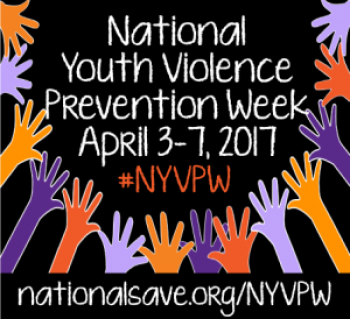Showing Support For Our Most Vulnerable Youth During National Youth Violence Prevention Week

By Catherine Armstrong, Juvenile Justice Fellow
April 3-7 is National Youth Violence Prevention Week. This important week of advocacy is led by Students Against Violence Everywhere (SAVE), a founding partner of the National Youth Violence Prevention Week Campaign. This year, the campaign is specifically focusing on the role we can all play in promoting safer communities that will help ensure fewer youth become engaged in violent behavior.
For each day of this week, SAVE has mapped out specific challenges that anti-youth violence advocates can tackle to help reduce youth violence in our communities. In addition to all of these crucial ways we can contribute to reducing youth violence, it is important to recognize the role that juvenile justice reform can play in reducing youth violence and making our communities safer. Keeping youth out of the adult justice system is key in the fight to end youth violence and to ensure public safety. When in the juvenile justice system, youth are very likely to have access to education, rehabilitative programs such as mental health treatment, counseling or medical services, and to receive age-appropriate care in general. In adult facilities, these resources are often scarce, if not nonexistent.Most youth are denied education and rehabilitation services that are necessary for their development when in adult prison. A survey of adult facilities found that 40 percent of jails provided no education services at all, and only 11 percent provided special education services. This lack of programs increases the difficulties that youth will have once they return to their communities, and contributes to increase the likelihood they will reoffend. In fact, youth who are prosecuted in the adult system are 34 percent more likely to recidivate and with more violent offenses than those handled by the juvenile system.
Research shows that the brain does not fully develop until a person reaches their early to mid-20s. While their brains are still developing, youth are more prone to make quick, inconsiderate decisions and to participate in risky activities. But they are also more likely than adults to be permanently traumatized by the harsh realities of the adult system.
We need to support our youth through every situation by fostering their development to ensure that they are not subjected to violence and that they become safe, productive adults.
This week, join the National Youth Violence Prevention Week Campaign in raising awareness on youth violence and the fight to end it. For justice-involved youth, appropriate rehabilitation and support services are absolutely necessary to keep them away from violence and ensure public safety.

